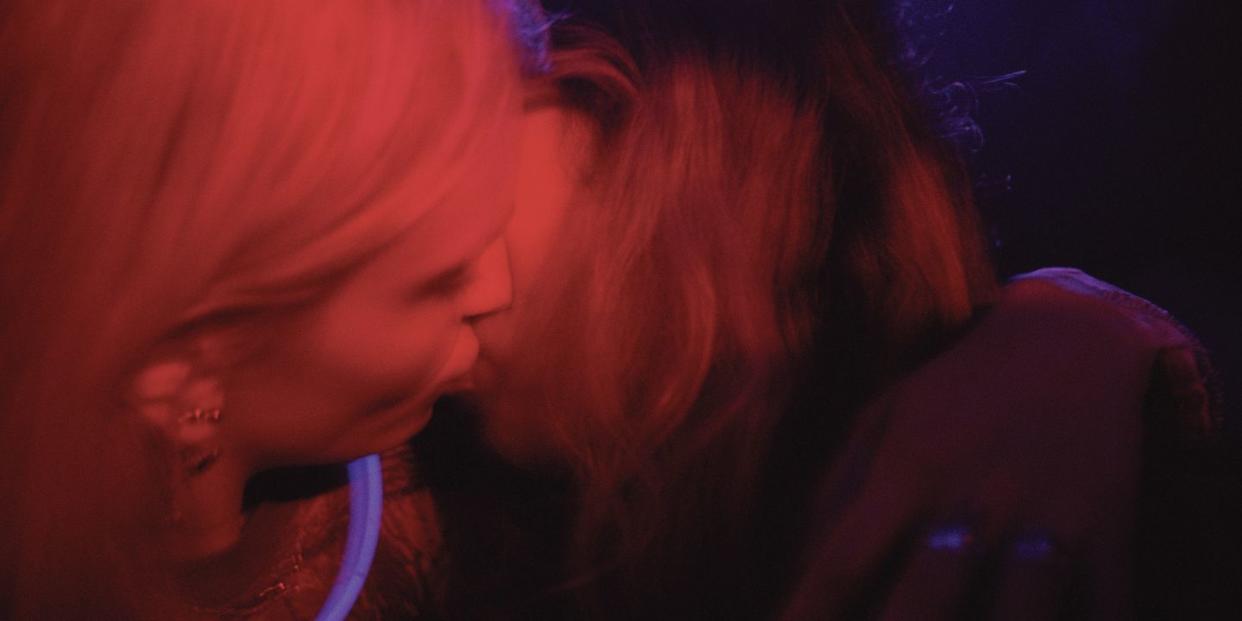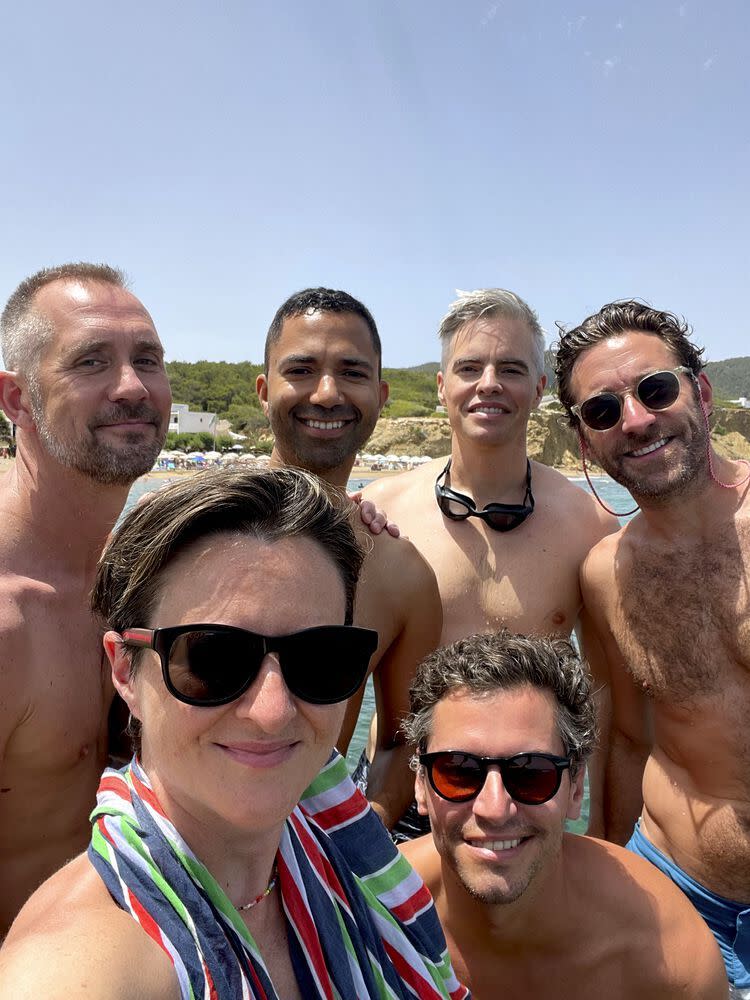Gay, As In Happy: The Power Of Queer Joy

What was that gift we gave each other when our eyes met? The possibility of sex? Yes, but something else. Validation. To desire and be desired in return. Maybe we’d slam into the ladies together. Or we’d come up out of the club for air, finding some doorway in Soho Square to kiss in the shadows. I’d feel the night inside me then, reckless moonlight, thrilling pinpricks of stars.
It was the year 2000. I was 18 and out in every sense, a veteran lesbian by then, having confirmed my sexuality sometime before my GCSEs. London’s Soho was my playground. I started kissing strangers on dance floors, circa Madonna ‘Ray of Light’. 'And I feel, and I feel, and I feel like I just got home. And I feel…' That rush. I was young, good looking and enjoying the heady cocktail of excitement and safety that comes from finding your people. Being gay was the best thing in my life. In many ways it still is.
Oh the parties! The beauty! The humour! The culture! Drag! Pop! Camp! Lesbians! According to facts, all the funniest and most interesting people in the world are gay. All the best dressed people are gay. We have the best sex. The nicest homes. We are the most emotionally smart and intellectually evolved. Why would anyone be straight?
If this brazen hubris makes you uncomfortable, it’s worth considering that we’re more familiar with the idea of ‘gay shame’ than we are ‘queer joy’. There are so many tragic stories of LGBTQ people leading unfulfilled lives. I've lost count of the number of movies and novels where the lesbian character dies at the end. I wanted to subvert all these sad tropes in my debut novel This Love.
I know that it's rare to have such an uncomplicated relationship with otherness. I was born into a family that made it easy for me to be myself. I grew up a short bus ride from the centre of queer city life and I went to a state school where I was one of a number of gay and bisexual teenagers. I’ve met enough other LGBTQ people with very different stories to appreciate my privileges. I’ve always seen my sexuality as a kind of magic power. I’m not just ‘proud’, I’m really pleased I was born this way.
The portal to queer Narnia was first opened by my best school friend Will who had come out as gay when he was just 14. Through him, I was introduced to the kind of world most people only discover once they’ve left home. In year nine we started going to an LGBTQ youth group in Hackney. It didn’t take long to be swept up into a scene with nascent drag queens, baby butch lesbians, wannabe twinks and boys who knew the Steps choreography better than we did. By sixth form, I had a girlfriend in the year below.
There was drama of course, gossip and heartbreak and messy, drunken house parties that often ended in tears, but not once was I made to feel that being gay was wrong or weird or a problem to solve. Sure, I was bullied for being a bit of a swot, but not for my sexuality. My crew of queer friends became my refuge and together we found our strength and confidence. We could take on the world.
Once I left school and started an art foundation course at Camberwell, I really thought I had arrived. There I met my next best gay male friend Sam. He had blonde hair down to his waist and the kind of face that red ropes lifted for. We were often sucked into the orbit of some B-List celebrity for the night. I’ll never forget the time Cilla Black and Nicky Haslam plied us with champagne at Shadow Lounge. By then I felt a deep sense of belonging in gay spaces. To this day I love that I can be anywhere in the world, Google the nearest gay bar and discover a place that feels familiar and fun. What do straight people have? Wetherspoons?
Fun. There’s no one better at finding it, making it and having it than us queers. Think of the greatest parties throughout history from the Roman Empire to Studio 54 and you can guarantee that there was a gay or two involved. My community owes a great debt to the black queer people who created the iconic Ballroom scene in 1980s New York, as it has influenced so much of our queer nightlife, and wider popular culture, most notably Beyoncé’s Renaissance album.

Our commitment to hedonism may have been born out of centuries of oppression and a need to hide, to create our own spaces when the world outside offered none, but it means we remain the hosts with the absolute most.
As soon as I got to university in Leeds, I opted out of freshers week and befriended a gay boy in my first lecture. We quickly became a power couple and with the arrogance of our youth believed that we ruled Queen’s Court and the handful of other gay venues in the city. With Joe by my side, university was a blast. We dipped our toe into the straight world of pub crawls and student union parties occasionally but would normally run squealing back to the little flat where we lived, just the two of us, to watch Will & Grace on video.
Now I’m a parent, I’m in my 40s, I’m not exactly tearing up the clubs like I once did but being in queer spaces with queer people still fills me with joy. At my age there’s an even greater shorthand with other LGBTQ folks; a knowing nod as if to say, however different the journey, we got here, and isn’t it wonderful.
I love the lingua franca of queer life. I love that it’s impossible to explain why the line 'Angela Basset did the thing' was so funny; I love that sometimes 'padam padam' is the answer. I love how we talk about sex and challenge norms with open relationships, and new ways of gender non-dependent parenting. I love that we care about dress codes, that we have friends who are two decades older or younger than us; that we will be the first to join a protest and be the last to leave a dance floor.
Last summer I went to Ibiza with Joe and a gaggle of our gay friends, for his 40th birthday. Crashing through waves as Formentera disappeared behind us, I lay on the stern of a boat and watched the sky slip on a softer evening blue. It was still so warm. Salt water splashed my bare chest. Joe was careering around looking for the last bottle of prosecco. The others lounged sleepy and sun drunk on the deck.
Andy, one of our university friends, joined me and we were silent for a while, enjoying the sobering slap of the wind. We were almost back on the island, where another night of gay revelry awaited. ‘We’re so lucky’, Andy said, lying back on his towel. I stretched out my arm so our hands touched. Lucky to be here. Lucky to be queer. And I feel, and I feel like I just got home. And I feel… Still that rush of belonging is within me.
'This Love' by Lotte Jeffs is out now (£22.00, Dialogue Books, eBook and audio are also available)
You Might Also Like


